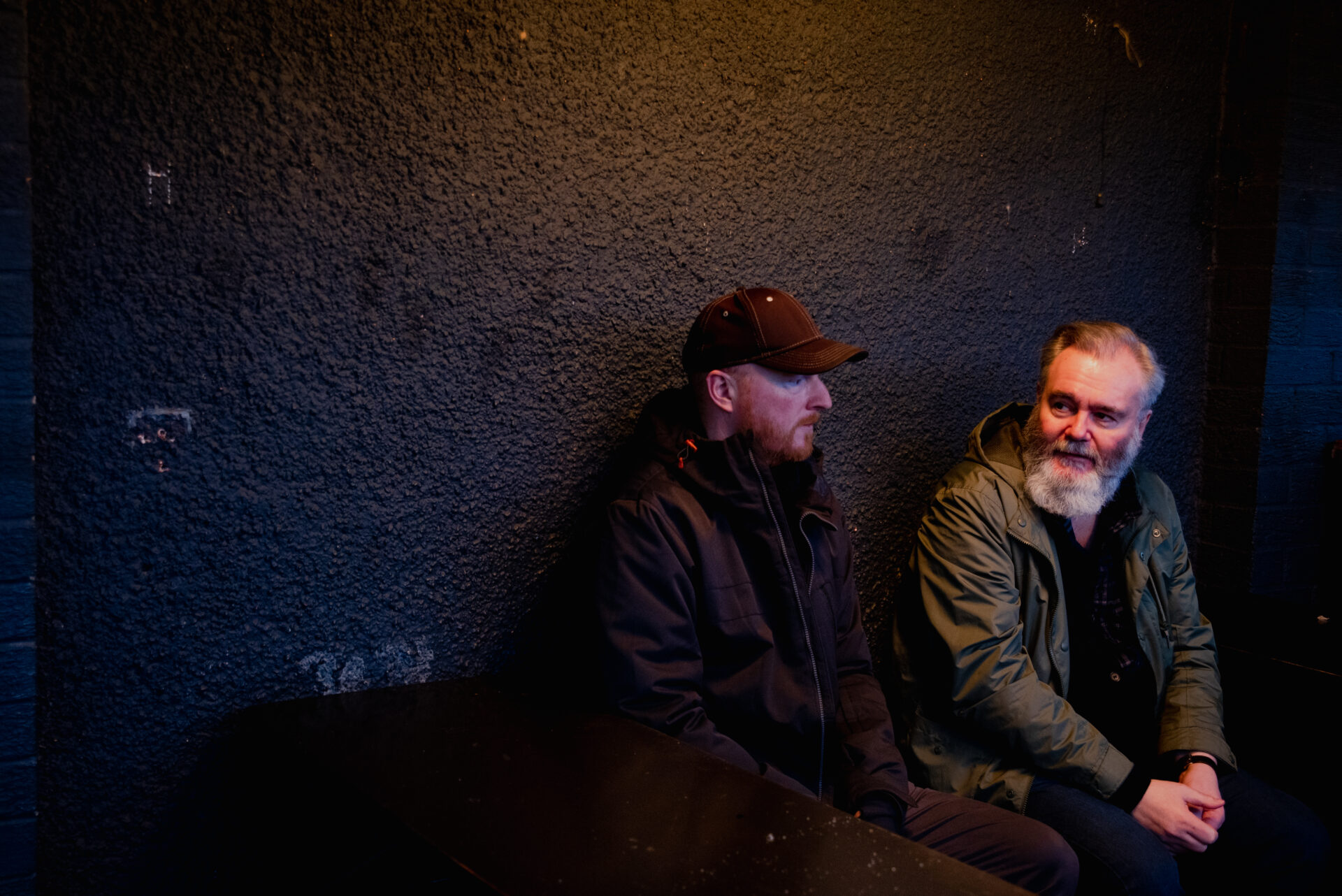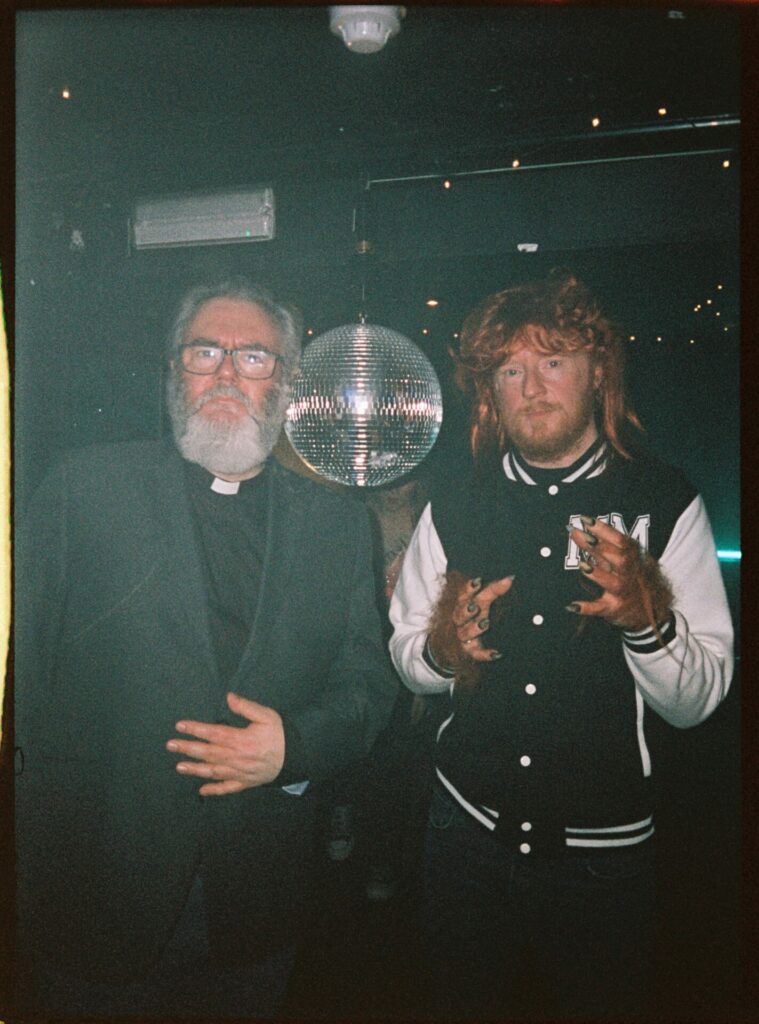Decaying bodies and digital breakdown: Arab Strap take us inside their striking eighth LP
The superb 2021 comeback As Days Get Dark re-established Scottish cult icons Arab Strap as one of the planet’s most boldly autobiographical acts. On audacious follow-up ‘I'm totally fine with it don't give a fuck anymore’ they’re shifting their gaze outward – at the insulation and isolation of an internet-driven world that’s supposed to be more and more connected…
By Sam Law

Arab Strap rarely start out with a grand plan. They just write one song, then another.
A 15 year break between albums found vocalist/drummer Aidan Moffat and multi-instrumentalist Malcolm Middleton probing the possibilities of their partnership on brilliant 2021 return As Days Get Dark. Cutting ties to the bygone era with a razorblade opening couplet – ‘I don’t give a fuck about the past / Our glory days gone by / All I care about right now / Is that wee mole inside your thigh…’ – that record found the pair revisiting their old romantic haplessness and scuffed Scottish worldview with another decade-and-a-half on the clock.
Big issues were unpacked via intimate snapshots. Lead single The Turning Of Our Bones wrapped voodoo ritual and stomach-turning imagery into a remarkably poignant portrait of love in middle age. ‘Fable Of The Urban Fox ‘was a stark condemnation of the callousness shown towards immigrants via the metaphor of a family of small mammals living at the bottom of Moffat’s garden. Another Clockwork Day imagined (or maybe recounted) a session of stealthy self-pleasure over the faded photos of a current lover in their well-toned youth.
“We all enjoy a tug sometimes, you know?” the big-bearded frontman cracks a broad grin. “I’m actually very proud of that song. I was in this asinine argument with someone on Twitter when they just wrote back with this message that said, ‘Fuck off with your stupid songs about wanking!’ I thought to myself, ‘Wait a minute, I could write a song about wanking…’”
Three years down the line, the songs have taken a different shape for album eight. With the predictable ruminations on ageing and time passed, and Arab Strap’s regulation preoccupations (as per Wikipedia: ‘depravity, drinking and despair’) somewhat out of their system, ‘I’m totally fine with it don’t give a fuck anymore’ casts its gaze on the modern nature of human interaction.
“Is this the least sexy Arab Strap album?” Moffat turns a question over. “I’d say it’s the least sexual. A lot of the songs are about the state of the modern world: how it’s changed – not even over the course of our lifetime, but in the last 15 years. Mostly, it’s about how, post-pandemic, a lot of people like myself have found themselves online far too much. It’s about that duality between the online and physical worlds: the need to break away to absorb what’s going on around us.”
“It was so much easier in the old days, when we could just say it’s all about drugs and shagging,” deadpans Middleton, stroking his chin at the freewheeling chat.
Where less imaginative minds might rail against the well-discussed issues of self-image fostered by social media – unattainable aesthetics, the need to project a perfect life – these songs dig deeper. The wry album title is lifted from a passive-aggressive sounding text, sent by the band’s touring drummer, which they found funny. Lead single Bliss, written during sessions for As Days Get Dark but a poor fit for that record, assumes the perspective of a woman terrorised by “the worst kind of cowards” online. Allatonceness (as in ‘all-at-once-ness’, a phrase borrowed from Marshall McLuhan’s 1967 tome The Medium Is The Massage) reckons on the torrent of noise and nonsense we scroll through every day. Summer Season was the point in the songwriting process where the ideas of communication and isolation came into focus: Moffat’s wish (‘Let’s pretend my Lockdown didn’t end’) chiming with many whose social lives were permanently changed by the endless screen-time of pandemic. Safe & Well, meanwhile, is an ode to those whose lockdown genuinely never broke: taking inspiration from a news story about a woman who died alone and lay undiscovered, decaying in her flat for months; asking how that’s possible in this ‘connected’ world.
“The first six Arab Strap albums are really all about a time in my life,” Moffat explains this next step for the band. “They were about being a young man trying to work things out romantically. And they had a nice big happy ending on [2005’s] The Last Romance. It’s a nice neat story. When a lot of bands reform they are too preoccupied with the past and try and recapture a sound they used to have. That’s impossible. It’s not coming back. Still, I kept working and writing songs, and it progressed. I don’t have a particularly exciting personal life to write about anymore. So I tend to write about the things that upset and disturb me. I’m never compelled to write about happy things. I never really feel like those are the feelings I want to express…”
Downbeat as the themes remain, the sound has shifted. The old Arab Strap formula – Moffat’s sing-speak layered over skeletal guitar and beats that seem to echo from nights out long past – has been superseded since their return. Allatonceness toys with almost metallic riffage. Bliss is the closest thing to an outright dance track they’ve ever done. Third single Strawberry Moon – the most personal song, and a departure from the record’s outward gaze to tackle some of Moffat’s recent personal struggles – combines rumbling bass and a euphoric chorus for an Arab Strap unlike anything we’ve heard before. Even final track ‘Turn Off The Light’, an indictment of conspiracy theory newspaper The Light, comes layered on spiralling synths as eerily hypnotic as its subject-matter. Across the board, middle-aged Moffat’s deeper, gruffer voice adds warmth and gravitas.
“Originally, the plan was that we’d do a series of singles rather than a new record,” Middleton unpacks the process. “Maybe four double A-sides. We liked the idea that every song could be the lead track. Then we got bored. We started with quite upbeat, catchy and dynamic songs. But then we started adding more different sounding ideas and it became an album. It’s been over two years working slowly on this one – probably the longest it’s taken us to make a record.”

“We’d been enjoying playing gigs again,” expands Moffat. “I enjoyed playing the bigger-sounding songs from As Days Get Dark, like ‘The Turning Of Our Bones’ or ‘Here Comes Comus’. They were the ones that got the best reaction. Subconsciously, I think that made us want to do something louder and livelier: something a bit more in-your-face than what we’ve been known for before. And I’ve been gravitating towards the bigger sounds, and the angrier ones. If it was an album about having a nice quiet time sitting in the sun, it would sound very different. But it’s not.”
Ironic as could be that Arab Strap started out subtle and introspective and have grown bolder and more outspoken with age, it’s a progression that the band themselves insist has come naturally. Middleton teases that they’d batted-around the idea of a stripped-back “piano album”, then suggests their going so emphatically in the opposite direction could be down to subconscious fear: of growing stale, being pigeonholed, fading away. To the contrary, it feels like fearlessness.
“It’s good that we’ve kind of done everything in reverse,” nods Moffat. “We started with the quiet, introspective records. Now we’re making noise. I think part of me just wants to make up for all that time we spent playing 10-minute songs really quietly. Now we get to go out there and have fun and make a point loudly. Everyone’s a bit narrow-minded when they’re young. When we started in 1996, I had a very clear idea of what I liked. But you always get stuck at the end of your cul de sac.”
“We had to break away,” Middleton picks up. “Getting back together, it’s about the creative surprises and not knowing what’s going to happen with each other. Two years ago, I’d never have imagined this album would sound like it does. It’s like there’s a third part of Arab Strap – and it’s working well. What we do as a pair is different to what we can do on our own.”
Emboldened by that possibility, the future might be brighter than it’s ever been. On a personal level, they seem happy and engaged, dovetailing family life around musical darkness and enjoying how one big positive of the internet age is that older music is no longer lost to current generations. “My son was asking me about music the other day,” Middleton laughs, “whether I’d ever heard of this guy called Eminem?” Moffat, meanwhile, has finally managed to scale-back his social media addiction following the transformation of Twitter into ‘X’. “It’s changed,” he shakes his head. “The algorithms seem to be designed to pit people against each other and wind them up nowadays. I preferred when you have to go looking for a fight than having the fight come straight to you.”
Creatively, they’re excited to express themselves back onstage. Following last year’s semi-acoustic anniversary shows for notoriously bleak second album Philophobia, 2024’s full-band sets promise banger-after-banger. “Well, banger-after-banger doesn’t really work,” Middleton interjects. “You need a wee dip!” The fantastic video for Strawberry Moon – a tale of priests hunting werewolves around the streets of Glasgow – marked the duo’s first appearance in a music video in 25 years. For confessed horror hounds (Moffat is a big fan of Sydney Sweeney’s Immaculate) the oddball concept – dressing up as clergy, firing off water pistols full of holy water and revving mobility scooters around the city’s towering necropolis – was too good to pass up.
“We were fighting over which of us would play the priest or the werewolf,” Middleton grins. “Then it turned out Aidan had two priest’s outfits just sitting in his cupboard, ready to go.”
“I’ve always got one handy, just in case you need it,” the singer bats back. “The best bit was getting the train home. I stopped at Tesco outside Glasgow Central for some ciders and got a fish and chips and all these people were passing by looking at this ‘priest’ standing there in an alleyway, just looking pleased with himself with his takeaway and bag of bottles!”
Beyond that? A run of festivals next summer will follow this year’s headline tours. Then 2026 will mark 30 years of the band – with Moffat promising “A few celebrations, maybe a gig here and there.” And as the human experience continues to unspool, more music will inevitably follow. Arab Strap wouldn’t write these songs if they didn’t care about reaching people, they insist, and as we continue to drift into more uncertain times, their brand of gritty empathy is as invaluable as ever.
I’m quite conscious of getting older,” Moffat signs off, with cod-resignation and a sparkle in his eye. “We don’t have millions in the bank. Maybe if we did, we’d just retire. But what else would we do? I don’t feel old. I don’t feel like I need to slow down or anything. I’m just happy to persevere. And in today’s climate, we’ll all be working until we die, anyway…”
